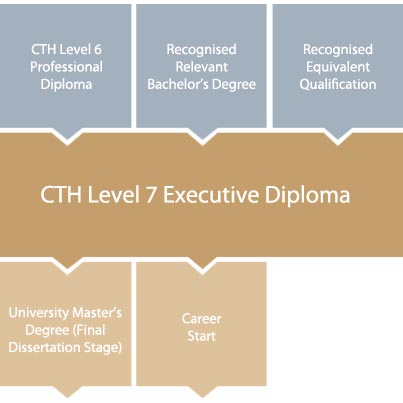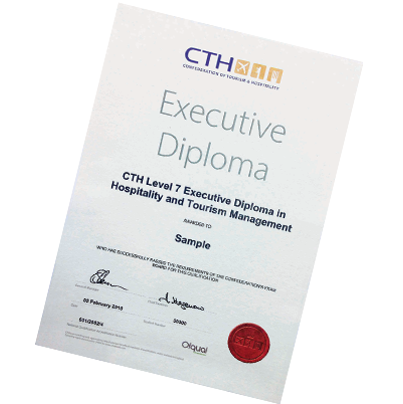
Level 7 Executive Diploma in International Hospitality and Tourism Management
The Level 7 Executive Diploma in International Hospitality and Tourism Management provides an industry relevant postgraduate academic progression route for those who want to build on their bachelor's level qualification or improve their career progression.
Programme Overview
This university endorsed international qualification is appropriate for both hospitality and tourism graduates and experienced hospitality and tourism managers without a first degree.
It also provides an effective route for graduates in other fields who wish to make a career change into the growing hospitality and tourism sectors.
This is a 360 Guided Learning Hour programme where students are required to demonstrate interpersonal, self study and research and presentation skills throughout the qualification. Assessments are developed to encourage skills that will provide students with a very strong foundation for further advancement in the hospitality and tourism sectors.
Students can achieve the Guided Learning Hours in a combination of face to face classroom interactions, attending seminars, visits to hotels, self study and group study, as well as independent study and research work.
The postgraduate Level 7 Executive Diploma assessment methods have been designed to enable students to demonstrate Level 7 outcomes for this level of qualification.
Given the broad and highly varied nature of the hospitality and tourism industry, candidates will need to demonstrate the higher-level skills and qualities specified in the Level 7 outcomes within a non-homogeneous vocational context.
Entry Requirements
- Minimum of a recognised university degree in a relevant hospitality, tourism or management subject. Equivalence for non-UK degrees should be evaluated through UK ENIC.
- Successful completion of the CTH Level 6 Professional Diploma.
- Other recognised relevant qualification at Level 6.
All applicants must be individually pre-approved for admission by CTH and be 22+ years old, have good English (to at least IELTS 6.0 or equivalent) and possess high level academic study skills (Harvard referencing and criticality).
Entry & Progression

Sample Certificate

Syllabus Overview
Level 7 Executive Diploma in International Hospitality and Tourism Management (QAN: 603/7229/1) |
||||||
|---|---|---|---|---|---|---|
| Students must achieve all 8 mandatory units, providing a combined 120 credits all at level 7. | ||||||
| Credit Value (CV): 120 | ||||||
| Guided Learning Hours (GLH) for Qualification: 360 | Total Qualification Time (TQT): 1200 | |||||
| UK funding eligibility: N/A | ||||||
| Unit Code | Unit Title | L | CV | GLH | URN | Assessment Method |
| 7SM | Strategic Management | 7 | 15 | 45 | Closed book written examination | |
| 7MF | Managerial Finance | 7 | 15 | 45 | Coursework assessment - Case study | |
| 7OMHT | Operation Management in Hospitality & Tourism | 7 | 15 | 45 | Closed book written examination | |
| 7MCEM | Marketing & Customer Experience Management | 7 | 15 | 45 | Coursework assessment - Marketing audit (50%) & Multimedia presentation (50%) | |
| 7GHRM | Global HRM Strategies | 7 | 15 | 45 | Coursework assessment - Assignment | |
| 7DM | Destination Management | 7 | 15 | 45 | Research paper | |
| 7EPM | Events & Project Management | 7 | 15 | 45 | Coursework assessment - Event management plan (group), report and presentation (70%) & Post-event (individual) reflective report (30%) | |
| 7RMHT | Research Methods in Hospitality and Tourism | 7 | 15 | 45 | Coursework assessment - Assignment (80%) & Presentation (20%) | |
| Executive Diploma Total (8 units) | 120 | 360 | ||||
Including the globalization of technologies/markets and the role of strategic alliances in nurturing competence for strategic advantage.
Managerial Finance:Key accounting and finance practice, evaluation and associated decision-making tools.
Operations Management in Hospitality & Tourism:Emphasises business awareness, proactive and logical thinking, research and critical analysis for sound tactical and strategic management decision-making.
Marketing & Customer Experience Management:Following the customer journey from their initial research through to post-purchase behaviours.
Examines theory and evidence of workforce management, including metrics of human capital, talent management, compensation and leadership.
Destination Management:Strategic analysis of destination development, sustainability & planning.
Events & Project Management:Importance of effective project management, project management knowledge systems, key methodologies, and tools/techniques to initiate, plan, implement and evaluate.
Research Methods in Hospitality & Tourism Management:The skills needed to ensure decisions are well-informed.

